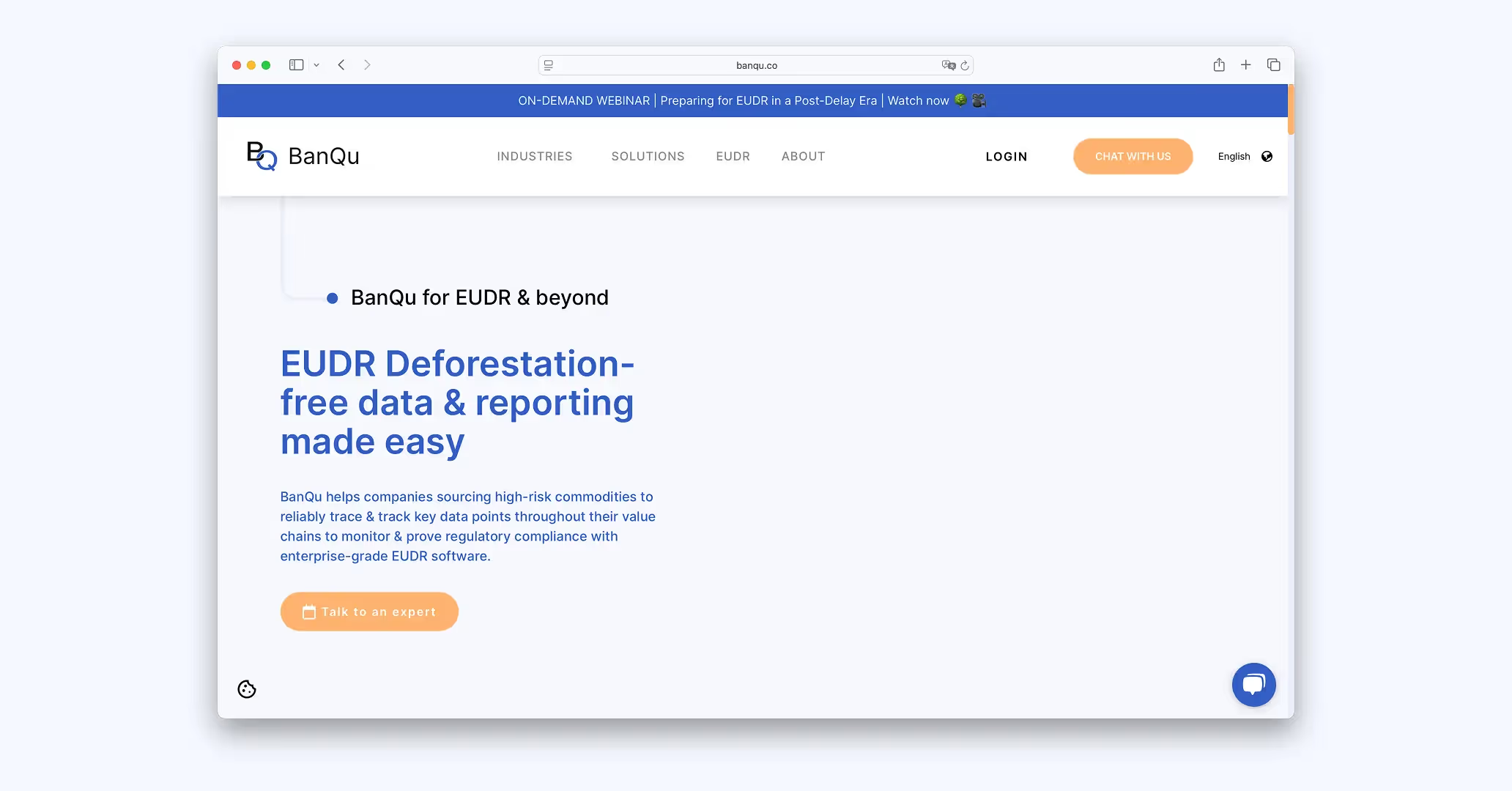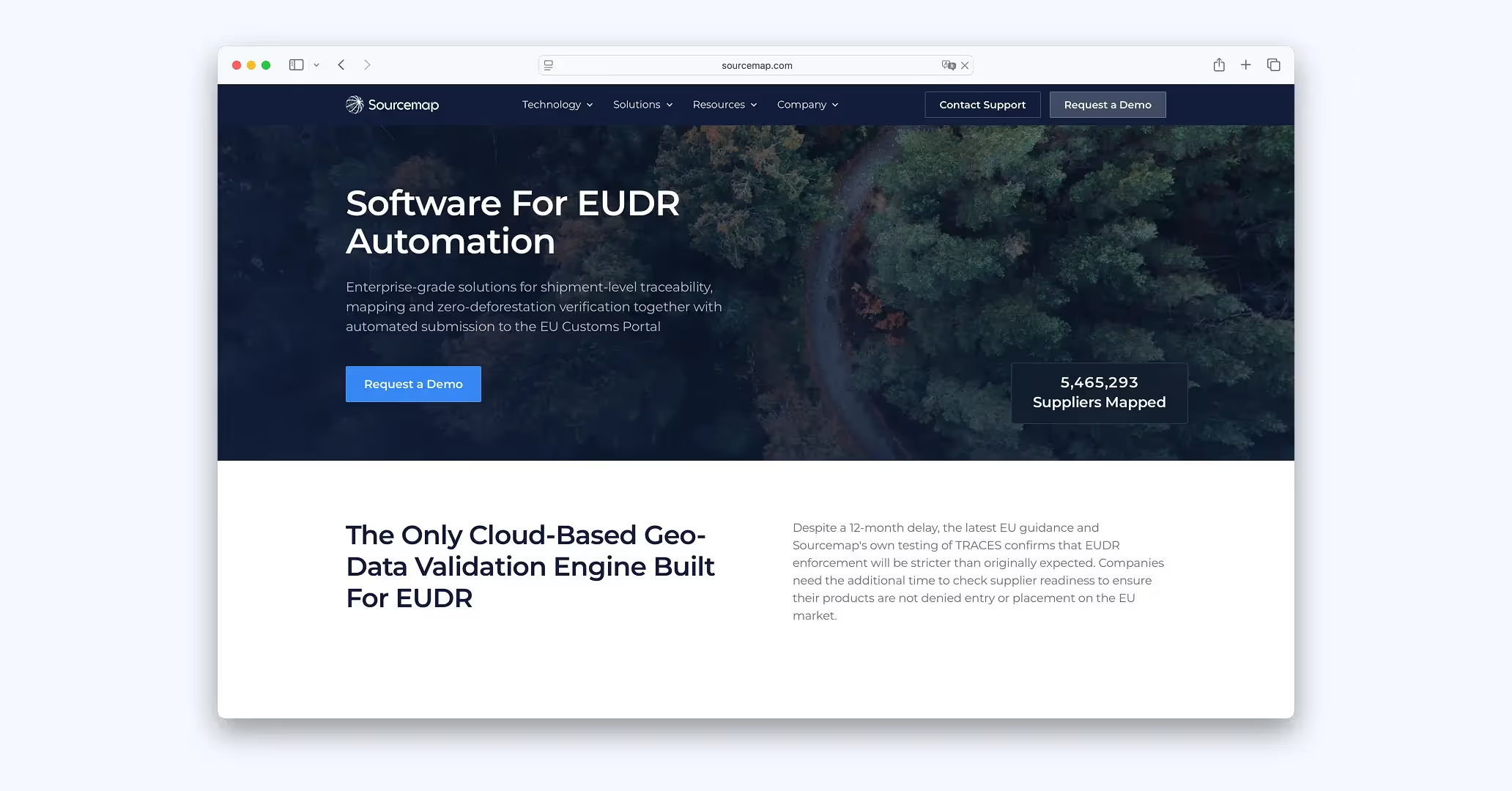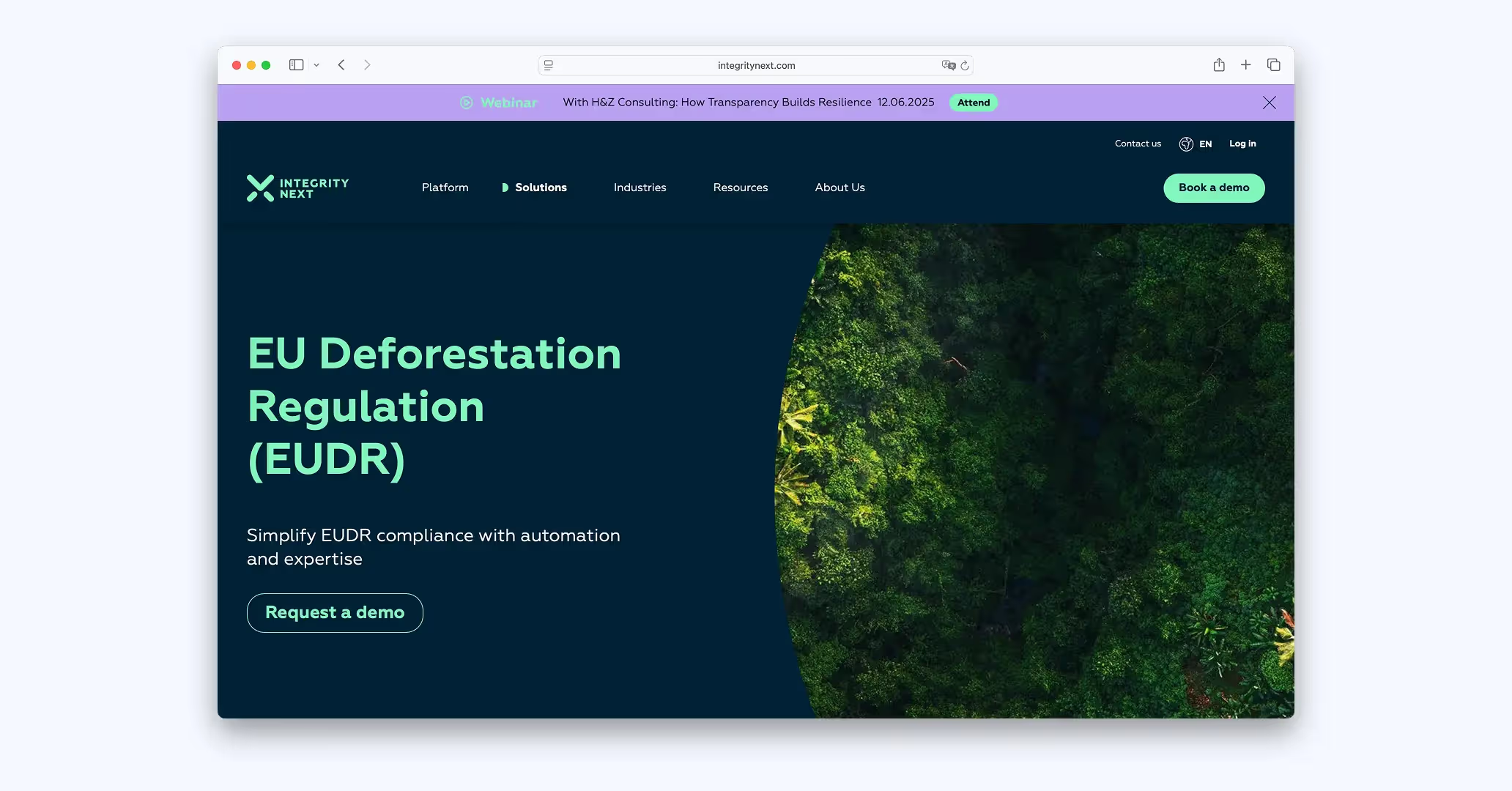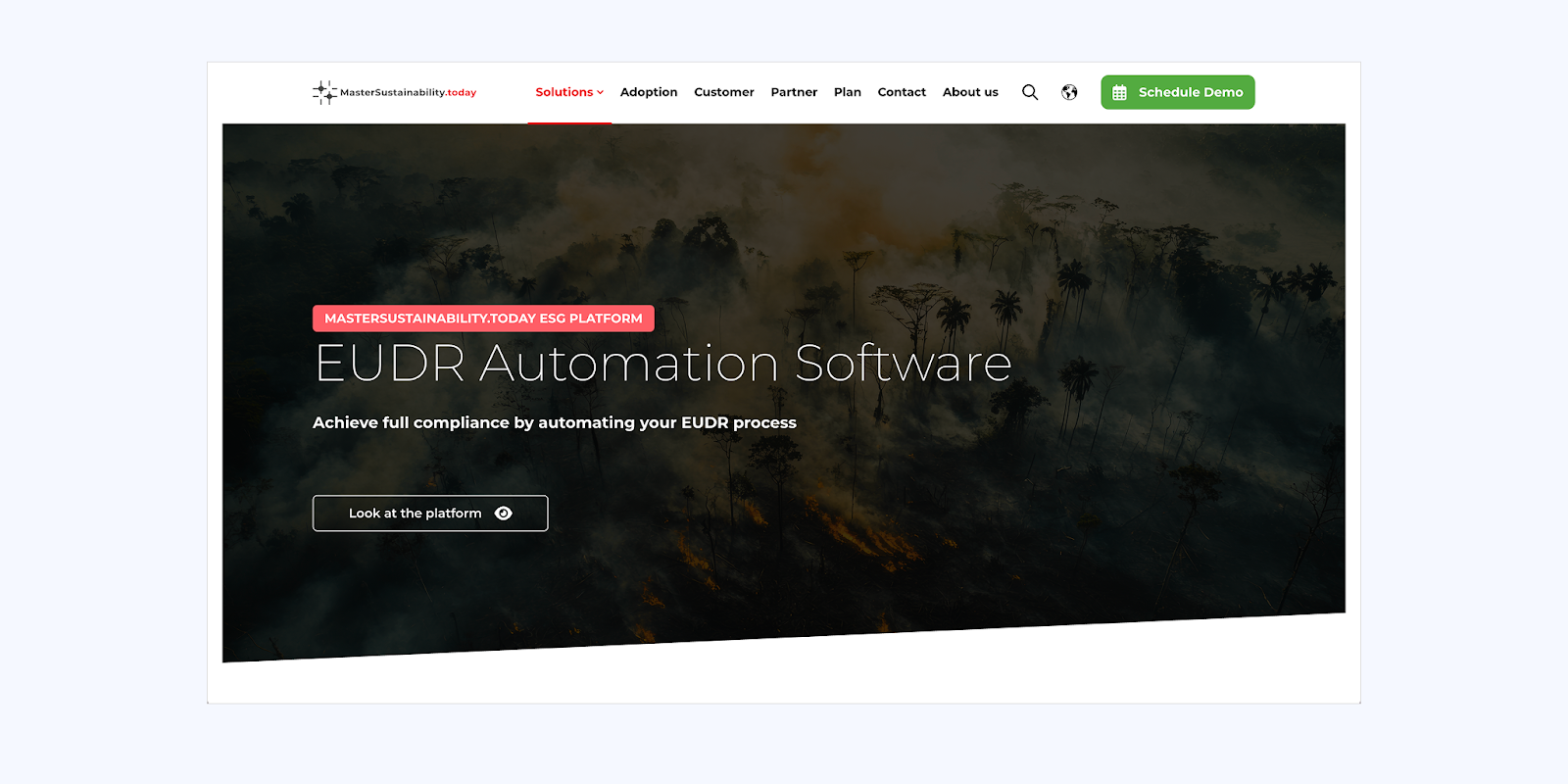Disclaimer: New EUDR developments - December 2025
In November 2025, the European Parliament and Council backed key changes to the EU Deforestation Regulation (EUDR), including a 12‑month enforcement delay and simplified obligations based on company size and supply chain role.
Key changes proposed:
These updates are not yet legally binding. A final text will be confirmed through trilogue negotiations and formal publication in the EU’s Official Journal. Until then, the current EUDR regulation and deadlines remain in force.
We continue to monitor developments and will update all guidance as the final law is adopted.
Disclaimer: 2026 Omnibus changes to CSRD and ESRS
In December 2025, the European Parliament approved the Omnibus I package, introducing changes to CSRD scope, timelines and related reporting requirements.
As a result, parts of this article may no longer fully reflect the latest regulatory position. We are currently reviewing and updating our CSRD and ESRS content to align with the new rules.
Key changes include:
We continue to monitor regulatory developments closely and will update this article as further guidance and implementation details are confirmed.
Mapping a complex supply chain is hard enough on its own, but the EU's Deforestation Regulation (EUDR) adds a whole new layer. The law only allows deforestation-free products on the EU market, which means companies now need to prove exactly where their goods come from and how they were produced, right down to the plot of land.
There’s no shortage of tools popping up to help with this, but figuring out which one fits your business best can feel overwhelming.
This guide breaks down some of the top traceability platforms, risk assessment tools, and due diligence systems available right now, plus a few tips on what to look for so you can choose with confidence.
In this guide:
Before jumping into the tools, let’s quickly recap what EUDR compliance software is all about.
The EUDR is a new law aimed at ending the EU’s contribution to global deforestation. Businesses must prove that their products are deforestation-free and meet local legal requirements.
With the world losing primary tropical forest at a rate of about 11 football fields every minute (as of 2022), it's clear why regulations like the EUDR are being put in place. But for sustainability leads, compliance teams, and especially SMEs, this brings big changes (and challenges) in how supply chain data is collected, verified, and reported.
Think chasing suppliers for GPS coordinates and legal documents, struggling to match products to the right HS codes, pulling data from scattered sources, and trying to avoid blocked shipments or fines, all while guessing what “negligible risk” really means…
To tackle these bottlenecks, many are turning to specialized EUDR compliance platforms.
These tools do the heavy lifting when it comes to assessing deforestation and legality risks across key commodities - including cattle, soy, palm oil, wood, cocoa, and rubber - before placing them on the EU market.
From geo-data and DDS submissions to risk mitigation and audit trails, they’re quickly becoming essential to support today’s complex, multi-tier supply chains.
{{custom-cta}}
In its latest vote, the European Parliament backed a delay to 30 December 2026 for large and medium operators and 30 June 2027 for small and micro operators. However, until the amended law is formally adopted and published in the Official Journal, the original 30 December 2025 deadline remains the legally binding date.
In practice, that means companies should continue preparing for full EUDR compliance, while planning for enforcement and checks to ramp up in line with the new 2026/2027 timeline once it is confirmed.
So, now we know what EUDR compliance tools are all about, let’s take a look at some of the best options out there for 2026 supply chain due diligence.

Coolset gives supply chain and compliance teams a single platform to manage EUDR from end-to-end - without spreadsheets, manual DDS creation, or building internal tools.
Operators and traders can trace shipments down to the plot level using supplier-provided GPS data, harvest records, and HS codes; screen for deforestation and legality risks using satellite imagery; and submit Due Diligence Statements (DDS) directly to the EU’s TRACES portal.
Website: www.coolset.com/eudr
Best for: Mid-market operators, traders and manufacturers that need to comply with EUDR - without building custom tools or hiring a dedicated ESG team.
Standout features:
Limitations: Coolset does not provide in-house consulting but works with selected partners for advisory and compliance strategy.
See the Coolset's EUDR solution in action. Request demo today.
{{product-tour-injectable}}

BanQu brings blockchain to EUDR compliance. It helps companies trace products back to the source, storing every data point on a tamper-proof ledger. This approach offers strong auditability and confidence in data integrity, especially across fragmented supply chains.
Website: www.banqu.co/eudr
Best for: Enterprises that need clear, reliable traceability to meet EUDR rules, especially those looking for full visibility into their supply chain and a tamper-proof record of compliance.
Standout features:
Limitations: May require significant initial effort to map complex supply chains, especially for companies lacking detailed visibility beyond their Tier 2 suppliers.

Sourcemap is built for complex global supply chains. It offers shipment-level traceability down to the plot, along with automated due diligence and risk checks across all supplier tiers.
Website: www.sourcemap.com/solutions/eudr
Best for: Enterprises with complex supply chains needing streamlined, large-scale EUDR compliance.
Standout features:
Limitations: Potential complexity involved in onboarding and training suppliers, particularly in regions with limited digital infrastructure or technical expertise.

IntegrityNext is an AI-powered platform designed to streamline compliance with the EUDR. It automates supplier outreach, collects geolocation data, and assesses risk, helping large companies meet deforestation-free goals at scale.
Website: www.integritynext.com/esg-solutions/eudr-deforestation-regulation
Best for: Large enterprises and multinational corporations seeking an integrated, automated approach to EUDR compliance across complex supply chains.
Standout features:
Limitations: The platform’s effectiveness relies on supplier data quality, especially in less digitized regions.

Passionfruit’s EUDR compliance software is built for automation. It streamlines responses to compliance requests from NGOs, customers, and regulatory authorities like National Competent Authorities (NCAs). This helps lighten the load for ESG and quality teams, cutting down repetitive tasks while keeping responses clear and consistent.
Website: www.passionfruit.earth
Best for: Mid-to-large companies looking to manage EUDR compliance more efficiently by automating due diligence workflows.
Standout features:
Limitations: Does not handle traceability verification or provide corrective action guidance.

MasterSustainability.today is an ESG and compliance platform that brings multiple regulations into one place. Companies can activate only the modules they need and use the platform to collect data, manage suppliers, run due-diligence checks, and prepare compliance reports.
It’s designed for organizations that want a central workspace to manage sustainability tasks and keep documentation organized and audit-ready.
Website: www.mastersustainability.today
Best for: Companies or enterprises that want to manage broad ESG compliance, supply-chain due diligence and reporting efficiently via a unified, digital ESG platform.
Standout features:
Limitations: The platform depends on digital, well-structured supplier and supply-chain data. If your supply-chain is not digitalized, results may be limited.
When selecting an EUDR compliance tool, consider your business’s specific needs, supply chain complexity, and resource availability to choose the solution that best aligns with your compliance and sustainability goals. Let’s take a look at some key decision criteria:
Under the EUDR, companies must trace materials back to the exact plots where they were produced, using geolocation data (polygons for plots over 4 ha, points for smaller ones).
For example, in 2023, 83% of cocoa in Ghana and 82% in Côte d’Ivoire was traceable to the farm level, showing progress, but also gaps. Choosing software with strong traceability features helps ensure compliance and supply chain transparency.
Look for tools that automate the creation and submission of DDS, integrating seamlessly with the EU’s TRACES system.
The software should align with your Environmental, Social, and Governance goals, supporting broader sustainability reporting requirements.
A user-friendly interface for suppliers facilitates data collection and encourages compliance across the supply chain.
Opt for EUDR compliance tools that provide transparent risk assessments, allowing you to understand and justify compliance decisions.
Under the EUDR, companies must retain compliance records, like geolocation data, supplier details, and due diligence statements, for at least five years. This ensures that, if audited, all necessary documentation is readily accessible and verifiable.
Choosing a system with powerful data storage, easy retrieval, and clear audit trails is a must-have for compliance and maintaining trust with regulators.
By focusing on these criteria, you can select a software solution that not only ensures compliance but also enhances your supply chain’s transparency and sustainability.
When choosing EUDR compliance software, it helps to get clear on what really matters. These are the features that tend to make the biggest difference, especially for companies navigating complex supply chains or limited internal resources:
Whether you’re just getting started or scaling up, the right tool can save time, reduce risk, and make compliance far less stressful.
Coolset’s EUDR compliance tool is one of the few that ticks all the boxes, combining deep traceability, AI-powered risk assessment, automations and smart workflows in a way that’s intuitive and easy to roll out, even without a full ESG team.
And while this guide is published by Coolset, we’ve done our best to offer an honest, helpful look at all your options. That said, we’re genuinely proud of what we’ve built, and how much ground it covers.
Coolset’s EUDR product helps companies collect the right data, check for deforestation risk, and file Due Diligence Statements without chasing suppliers or working in complex spreadsheets. With Coolset, companies can import product and order data from your ERP, request documents from suppliers, and track everything in one place. The system flags missing or at-risk shipments and generates audit-ready DDS files that follow the mandatory EU TRACES format.
Request demo to see the tool in action.
Learn how to build traceability, run audit-proof risk assessments, generate DDSs in EU TRACES and stay audit-ready.

Get compliant by December 30 – map suppliers, trace origins, run risk assessments and submit due diligence in one connected system.

Based on customer case studies our team has developed a realistic timeline and planning for EUDR compliance. Access it here.